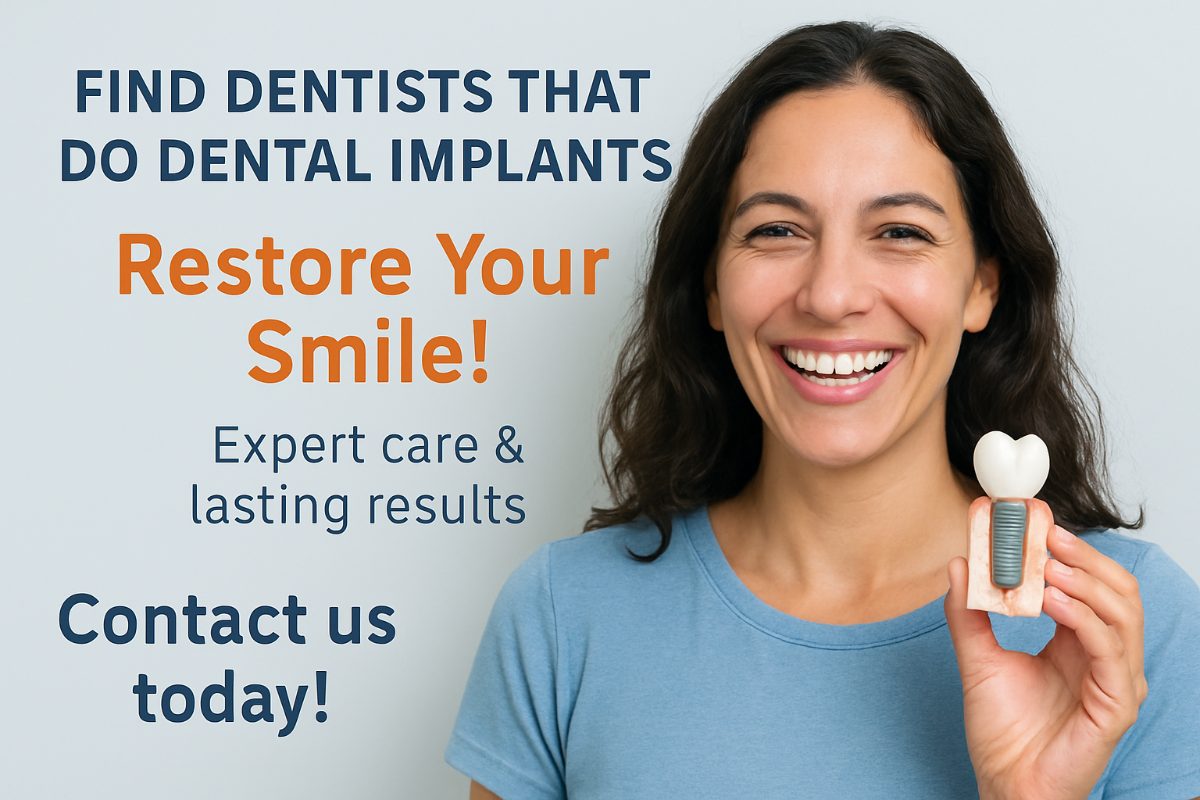Dental implants are a common long-term way to replace missing teeth. They can restore chewing, speech, and appearance when dentures or bridges fall short. If you’re deciding whether implants are right for you, this article explains what to expect and how dentists approach care for dental implants. It also covers costs and how to find affordable care from dentists that do dental implants.
Read on to learn who makes a good candidate, how providers evaluate you, what affects price and timeline, and the questions to ask before booking a consult.
Who is a good candidate for dental implants?
People choose implants for several common reasons:
- One or more missing teeth
- Loose or uncomfortable dentures
- Difficulty chewing or changes in speech due to missing teeth
- Desire for a long-term, natural-looking solution
That said, not everyone is an ideal candidate. Dentists consider your overall health and mouth health. Smoking, uncontrolled diabetes, and certain medical conditions or medications can increase the risk of implant failure. Adequate jawbone is also needed — if bone is low, a graft or other solution may be required before implants work well.
How dentists that do dental implants evaluate you
Oral and bone health assessment
First, your dentist will examine your mouth and take images. Common tools include dental X-rays and a CBCT (cone beam) scan. These scans show bone height, width, and the position of nerves and sinuses. Bone volume matters because the implant needs enough stable bone to hold securely. If bone is thin or missing, your dentist will discuss grafts, sinus lifts, or different implant options.
Medical history and treatment planning
Next, your provider reviews your medical history and medications. Certain drugs (like some osteoporosis medicines) and uncontrolled health issues may change the plan or require medical clearance. The dentist will also decide how many teeth need replacing and whether to use single implants, bridges, or full-arch solutions. Good planning includes a timeline, choices for anesthesia or sedation, and a discussion of risks and benefits.
Costs, timeline, and finding affordable dentists that do dental implants
Costs vary widely based on several factors:
- Type of implant and brand
- Number of implants (single vs. multiple vs. full-arch)
- Need for bone grafting or sinus lifts
- Extractions or other preparatory work
- Lab fees for crowns or bridges
- Provider experience and location
Typical timeline:
- Consult and imaging: 1 visit
- Surgery (implant placement): same day or scheduled within weeks
- Healing and osseointegration: commonly 3–6 months (some protocols allow immediate loading)
- Final crown or prosthesis: after healing or on a planned schedule
Tips to find more affordable care:
- Compare itemized quotes from several providers so you know what’s included.
- Ask about phased treatment — replace the most important teeth first.
- Look for financing plans, in-house payment options, or third-party medical credit.
- Check dental schools or training centers for reduced-cost treatment under supervision.
- Ask if the practice offers warranties or reduced fees for complications within a period.
How to choose the right provider and next steps
Ask these questions at your consult:
- How many implants have you placed, and what is your complication rate?
- Do you use CBCT imaging and 3D planning?
- Can I see before-and-after photos of similar cases?
- Who will do the surgery and who will make the final crown or prosthesis?
- What is included in the fee and what could add cost later?
- What financing or phased options do you offer?
We can answer your questions, review images, and explain payment options to help you decide. If you want to know whether implants are right for you, schedule a consult to get a personalized plan and clear cost estimate.






